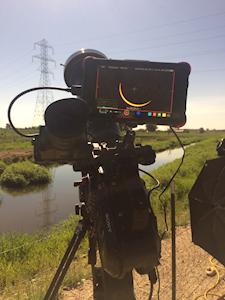Josh Wiese perfectly captures the solar eclipse with the Sony FS7 and Atomos Ninja Flame monitor recorder

When you’re trying to capture the moment of a lifetime, you can’t afford to take any chances. So when Josh Wiese and his teammates set out to film the solar eclipse this week - the first total eclipse to cross the US coast-to-coast for almost a century - he knew he’d need a lot of research and equipment he could count upon.
The stunning results surprised even the cameraman: “The first time I saw the ring around the sun, I was looking at the recorder. Right as the totality happened I pulled the solar filter out - and to see what I saw on the screen took my breath away. I’d tried to picture it, but it was more breath-taking than I could have even imagined,” said Wiese, who was working with his boss and his brother Jeremy Wiese, and their colleague Prestin Apsley. Together they usually make marketing and instructional videos for the Northwest Lineman College, which trains workers for the power industry.
The team used a Sony FS7 with their trusted Atomos Ninja Flame monitor recorder and a rented Nikon 600mm lens with a doubler on it, taking the lens to 1200mm. They also needed a special white light solar filter to expose properly and prevent damage to their equipment. They shot at 4k at 24 frames a second internally on the FS7 and simultaneously to the Ninja Flame, recording in ProRes 422 - creating two copies of the footage to insure against any mishaps. Their last bit of kit was lower-tech: a generator to make sure they didn’t run out of juice at a critical moment.
Having the Ninja Flame on the top allowed Wiese to follow the sun much more accurately: “Even just finding the sun is crazy difficult,” he explains.
“The sun is moving pretty quick through the frame, so I was having to readjust during the totality. We had a Sachtler tripod, but even so, with that long of a lens, just touching any part of the camera is going to cause a shake. I needed to have something I could put to the top and follow along and not worry about touching my eye to the viewfinder.”
He didn’t use the Ninja Flame for their trial run the day before and found it a lot harder to find and follow the sun.
Exposure was also critical, as there were no second chances. Here the Ninja Flame’s waveform and zebra tools allowed Wiese to be sure his exposure was correct as the eclipse went on. The recorder helped him “get my shot, make sure I wasn’t overexposing, and do it without touching anything”.
Even though an eclipse is all about darkness, the Atomos 1500nit high brightness screen came into its own as they set up their shots and filmed the early stages: “As it got darker it got easier and easier to see [the screen]. But even in the bright sun, it was super-easy to see, from 15ft away - I’d run over to the car to grab something and would be able to glance up and make sure everything was still in the frame.
“Another thing that was really helpful with the recorder was being able to magnify the image, even while recording. I used magnification function and could see the sun spots and those are what I used to focus on the sun.”
The crew bought the Ninja Flame after seeing it at the NAB show in April: “We’ve always made sure to stop by the Atomos booth and that has always been on our list of things to get and this year we made the plunge and brought it. We’ve been using it pretty religiously ever since,” said Wiese.
They spent over a fortnight researching and planning how best to capture the moment and scouting for locations, before settling on a quiet spot on a dead-end road just south of Payette, Idaho.
Asked why they went so such great lengths to get the shots Weise explains: “We knew the eclipse would be amazing and thought if we shot something related to the industry it could be really shareable for social media - luckily our CEO loved the idea.”
The Northwest Lineman College team shoot some pretty spectacular things in their line of work - climbing to the top of transmission towers to film, or capturing electrical arcs in slow-mo. Even so, Weise described the eclipse as “probably the most beautiful thing I’ve ever filmed”.
“The Ninja Flame made sure I was getting the shot I wanted and, especially being able to record for hours, was an invaluable tool to capture this experience that you can’t really plan for; you just have to rely on your tools and research. It might have been possible without it - but it definitely increased my chances of success in nailing the shot.”
The stunning results surprised even the cameraman: “The first time I saw the ring around the sun, I was looking at the recorder. Right as the totality happened I pulled the solar filter out - and to see what I saw on the screen took my breath away. I’d tried to picture it, but it was more breath-taking than I could have even imagined,” said Wiese, who was working with his boss and his brother Jeremy Wiese, and their colleague Prestin Apsley. Together they usually make marketing and instructional videos for the Northwest Lineman College, which trains workers for the power industry.
The team used a Sony FS7 with their trusted Atomos Ninja Flame monitor recorder and a rented Nikon 600mm lens with a doubler on it, taking the lens to 1200mm. They also needed a special white light solar filter to expose properly and prevent damage to their equipment. They shot at 4k at 24 frames a second internally on the FS7 and simultaneously to the Ninja Flame, recording in ProRes 422 - creating two copies of the footage to insure against any mishaps. Their last bit of kit was lower-tech: a generator to make sure they didn’t run out of juice at a critical moment.
Having the Ninja Flame on the top allowed Wiese to follow the sun much more accurately: “Even just finding the sun is crazy difficult,” he explains.
“The sun is moving pretty quick through the frame, so I was having to readjust during the totality. We had a Sachtler tripod, but even so, with that long of a lens, just touching any part of the camera is going to cause a shake. I needed to have something I could put to the top and follow along and not worry about touching my eye to the viewfinder.”
He didn’t use the Ninja Flame for their trial run the day before and found it a lot harder to find and follow the sun.
Exposure was also critical, as there were no second chances. Here the Ninja Flame’s waveform and zebra tools allowed Wiese to be sure his exposure was correct as the eclipse went on. The recorder helped him “get my shot, make sure I wasn’t overexposing, and do it without touching anything”.
Even though an eclipse is all about darkness, the Atomos 1500nit high brightness screen came into its own as they set up their shots and filmed the early stages: “As it got darker it got easier and easier to see [the screen]. But even in the bright sun, it was super-easy to see, from 15ft away - I’d run over to the car to grab something and would be able to glance up and make sure everything was still in the frame.
“Another thing that was really helpful with the recorder was being able to magnify the image, even while recording. I used magnification function and could see the sun spots and those are what I used to focus on the sun.”
The crew bought the Ninja Flame after seeing it at the NAB show in April: “We’ve always made sure to stop by the Atomos booth and that has always been on our list of things to get and this year we made the plunge and brought it. We’ve been using it pretty religiously ever since,” said Wiese.
They spent over a fortnight researching and planning how best to capture the moment and scouting for locations, before settling on a quiet spot on a dead-end road just south of Payette, Idaho.
Asked why they went so such great lengths to get the shots Weise explains: “We knew the eclipse would be amazing and thought if we shot something related to the industry it could be really shareable for social media - luckily our CEO loved the idea.”
The Northwest Lineman College team shoot some pretty spectacular things in their line of work - climbing to the top of transmission towers to film, or capturing electrical arcs in slow-mo. Even so, Weise described the eclipse as “probably the most beautiful thing I’ve ever filmed”.
“The Ninja Flame made sure I was getting the shot I wanted and, especially being able to record for hours, was an invaluable tool to capture this experience that you can’t really plan for; you just have to rely on your tools and research. It might have been possible without it - but it definitely increased my chances of success in nailing the shot.”





